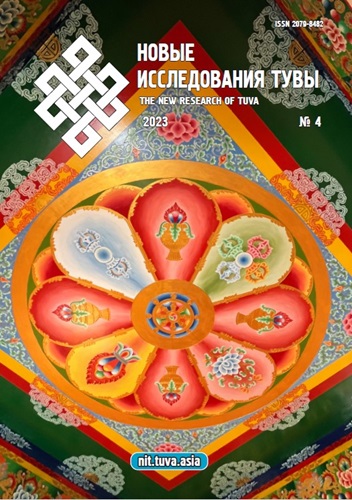Language distribution of urban everyday life in Sakha: sociolinguistic dimension (according to data from 2021)
DOI:
https://doi.org/10.25178/nit.2023.4.21Keywords:
Yakut language; linguistic distribution; interpersonal communication; linguistic situation; urban everyday life; Sakha; Yakutsk; Republic of Sakha; YakutiaAbstract
The article undertakes an analysis of the linguistic challenges pertaining to everyday language use and the distribution of language in the urban context of the Sakha (Yakuts) population in the Republic of Sakha (Yakutia, Russia). The analytical framework is constructed on the basis of extensive sociolinguistic surveys conducted in 2021 in Yakutsk. The study presents a dynamic portrayal of the functioning of the Yakut language in the polyethnic urban landscape of Yakutsk, drawing from prior research conducted in 1985, 2007, and 2014. Additionally, a comparative examination of the linguistic landscape in mono-ethnic rural areas within the republic is carried out.
A discernible trend is identified wherein the Yakut language is progressively assuming broader functions in interpersonal communication within the urban milieu. Urbanized Sakha individuals predominantly utilize the Yakut language in domestic settings, as well as in interactions with friends and colleagues. The sustained use of the Yakut language is primarily attributed to the heightened demographic and communicative influence of the urban Yakut-speaking population, which has undergone migration from rural areas. However, intergenerationally, there is a notable shift towards the displacement of the Yakut language by Russian. Bilingualism, particularly prevalent among the younger generation, functions as a transitional stage in this linguistic evolution. This phenomenon is observed not only in urban settings but is also evident in rural areas, potentially laying the groundwork for further linguistic transformations.
The study emphasizes that the infiltration of non-ethnic languages, facilitated by the propagation of imbalanced bilingualism and the adoption of new digital communication practices in unregulated (amorphous) communicative domains, may substantially erode the position of the regional non-dominant language, which holds official status within the republic.
References
Argunova, T. V. (1992) Yakutsko-russkoe dvuiazychie (sotsiolingvisticheskii aspekt) [Yakut-Russian bilingualism (sociolinguistic aspect)]. Yakutsk, IaNTs SO RAN. 88 p. (In Russ.).
Berger, P. and Lukman, T. (1995) Sotsial'noe konstruirovanie real'nosti. Traktat po sotsiologii znaniia [Social construction of reality. A treatise on the sociology of knowledge]. Moscow, Medium. 323 p. (In Russ.).
Bitkeeva, A. N. (2022) Model’ sotsiolingvisticheskogo prognozirovaniia i aktual’nye tendentsii iazykovoi politiki v regionakh Rossii [Model of sociolinguistic forecasting and the current trends of language policy in the regions of Russia]. New Research of Tuva, no. 4, pp. 38–52. (In Russ.). DOI: https://doi.org/10.25178/nit.2022.4.3
Blinova, T. V., Bylina, S. G. and Rusanovskii, V. A. (2020) Prognozirovanie izmeneniia chislennosti naseleniia sel'skikh territorii Rossii [Forecasting changes in the population of rural areas of Russia]. Nauchnye trudy: Institut narodnokhoziaistvennogo prognozirovaniia RAN, no. 18, pp. 466–482. (In Russ.). DOI: https://doi.org/10.47711/2076-318-2020-466-482
Borgoiakova, T. G. and Bitkeeva, A. N. (2020) Tuvinskii iazyk v pravovom i funktsional'nom izmerenii [Tuvan language in legal and functional aspect]. New Research of Tuva, no. 1, pp. 50–61. (In Russ.). DOI: https://doi.org/10.25178/nit.2020.1.4
Borgoiakova, T. G., Guseinova, A. V. and Pokoiakova, K. A. (2022) Yazyki Iuzhnoi Sibiri v dinamike sotsial'nogo konteksta [Languages of Southern Siberia in the dynamics of social context]. Abakan, KhGU im. N. F. Katanova. 160 p. (In Russ.).
Borgoiakova, T. G. and Pokoiakova, K. A. (2022) Smyslovye zony vospriiatiia iazykov v kontekste natsional'no-russkogo bilingvizma Iuzhnoi Sibiri [Semantic zones of language perception in the context of national-Russian bilingualism in southern Siberia]. New Research of Tuva, no. 4, pp. 53–64. (In Russ.). DOI: https://doi.org/10.25178/nit.2022.4.4
Breslavskii, A. S. (2020) Protsessy urbanizatsii v Respublike Sakha (Iakutiia): dinamika kliuchevykh parametrov (1989–2018) [Urbanization processes in the Sakha Republic (Yakutia): the dynamics of key parameters (1989–2018)]. Urbanistika, no. 1, pp. 68–81. (In Russ.). DOI: https://doi.org/10.7256/2310-8673.2020.1.32402
Byuraeva, Yu. G. (2023) Vnutriregional'naia migratsiia v Respublike Buriatiia: ob"emy, napravleniia, posledstviia [Intraregional Migration in the Republic of Buryatia: Volume, Directions, Consequences]. EKO, no. 4(586), pp. 149–165. (In Russ.). DOI: https://doi.org/10.30680/ECO0131-7652-2023-4-149-165
Gabdrakhmanova, G. F., Makarova, G. I. and Mukhamedzianova, A. R. (2016) Gosudarstvennye iazyki Respubliki Tatarstan: mnozhestvennost' izmerenii [State languages of the Republic of Tatarstan: multiple dimensions]. Kazan', OOO «Foliant». 207 p. (In Russ.).
Guboglo, M. N. (2013) Antropologiia povsednevnosti [Anthropology of everyday life]. Moscow, IaSK. 782 p. (In Russ.).
Dyrkheeva, G. A., Badaraev, D. D. and Khilkhanova, E. V. (2022) Buriatskii iazyk v polietnichnoi Buriatii: funktsional'naia distributsiia, iazykovaia kompetentsiia, motivatsii [Buryat Language in Multi-Ethnic Buryatia: Functional Distribution, Language Competence, Motivations]. Nauchnyi dialog, vol. 11, no. 5, pp. 116–135. (In Russ.). DOI: https://doi.org/10.24224/2227-1295-2022-11-5-116-135
Ivanov, A. G. and Poliakova, I. P. (2018) Sotsial'naia mifologiia v prostranstve povsednevnosti i mass-media [Social mythology in the space of everyday life and mass media]. Vestnik Permskogo universiteta. Filosofiia. Psikhologiia. Sotsiologiia, no. 1, pp. 5–15. (In Russ.). DOI: https://doi.org/10.17072/2078-7898/2018-1-5-15
Ivanova, N. I. (2017) Sotsiolingvisticheskie aspekty funktsionirovaniia iakutskogo iazyka v g. Iakutske: tsifry i fakty [Sociolinguistic aspects of the functioning of the Yakut language in Yakutsk: facts and figures]. Moscow, OOO «Iazyki narodov mira». 260 p. (In Russ.).
Ivanova, N. I., Nikitina, V. N. and Filippova, A. G. (2021) Sotsiolingvisticheskaia obuslovlennost' funktsionirovaniia iakutskogo iazyka v sfere shkol'nogo obrazovaniia: istoki nachinaiushchegosia krizisa [Sociolinguistic Conditionality of Yakut Language Functioning in Field of School Education: Origins of Incipient Crisis]. Nauchnyi dialog, no. 10, pp. 65–84. (In Russ.). DOI: https://doi.org/10.24224/2227-1295-2021-10-65-84
Ivanova, N. I. (2022) Sushchnost’ i svoeobrazie iazykovoi identichnosti molodezhi sakha v sovremennom sotsiokul’turnom kontekste [The essence and peculiarity of the linguistic identity of the Sakha youth in contemporary sociocultural context]. New Research of Tuva, no. 4, pp. 89–105 (In Russ.). DOI: https://doi.org/10.25178/nit.2022.4.7
Kaplunova, M. Ya. (2022) Otsenka vospriiatiia iazykovoi situatsii v Respublike Tyva mestnym naseleniem (na materiale polevogo issledovaniia 2021 g.) [Assessment of local residents’ perception of the language situation in the Republic of Tuva (based on the findings of a 2021 field study)]. New Research of Tuva, no. 4, pp. 28–37. (In Russ.). DOI: https://doi.org/10.25178/nit.2022.4.2
Salikhova, E. A., Iskuzhina, N. G., Mursalimova, Iu. R., Ismagilova, N. V., Aiupova, L. L., Dil'mukhametova, L. F. and Sitdikova, M. G. (2021) Iazykovaia mozaika g. Ufy [Language mosaic of Ufa]. Ufa, OOO «Aeterna». 414 p. (In Russ.).
Shakhbanova, M. M. (2022) Iazykovye ustanovki gorodskogo naseleniia Dagestana [Language instructions of the urban population of Dagestan]. Gosudarstvennoe i munitsipal'noe upravlenie. Uchenye zapiski, no. 2, pp. 265–271. (In Russ.). DOI: https://doi.org/10.22394/2079-1690-2022-1-2-265-271
Published
How to Cite
For citation:
Danilov I. A. and Ivanova N. I. Yazykovaia distributsiia gorodskoi povsednevnosti sakha: sotsiolingvisticheskoe izmerenie (po dannym 2021 g.) [Language distribution of urban everyday life in Sakha: sociolinguistic dimension (according to data from 2021)]. New Research of Tuva, 2023, no. 4, pp. 301-313. DOI: https://doi.org/10.25178/nit.2023.4.21
Issue
Section

This work is licensed under a Creative Commons Attribution-NonCommercial 4.0 International License.

Author(s) license holder(s) grant rights for their work to the journal (grantee of a license) under the simple non-exclusive open license in accordance with Art. 1286.1 «Open license for a research work, work of literature or fine arts», Civil Code of the Russian Federation.
New Research of Tuva publishes articles under the Creative Commons Attribution-NonCommercial license (CC BY-NC).
Since it is an open license, author(s) reserve the right to upload the article to their institutional repository, submit it to another journal (if it allows republications), or republish it on their own website (in full, or in part).
However, several conditions apply here:
a) The republished version must always contain the name(s) and affiliation(s) of the author(s), the original title and the hyperlink to the original version on the New Research of Tuva website;
b) It must be in open access, free of charge, and no category of readers must be in any way whatsoever advantaged over general readership.
c) should the contribution be submitted elsewhere by its author(s) without substantial modification (30% or more of original text unchanged), the body of the article should contain a disclaimer that the original version was published in New Research of Tuva (with a link to the respective page)
The CC-BY-NC is a non-revocable license which applies worldwide and lasts for the duration of the work’s copyright.










